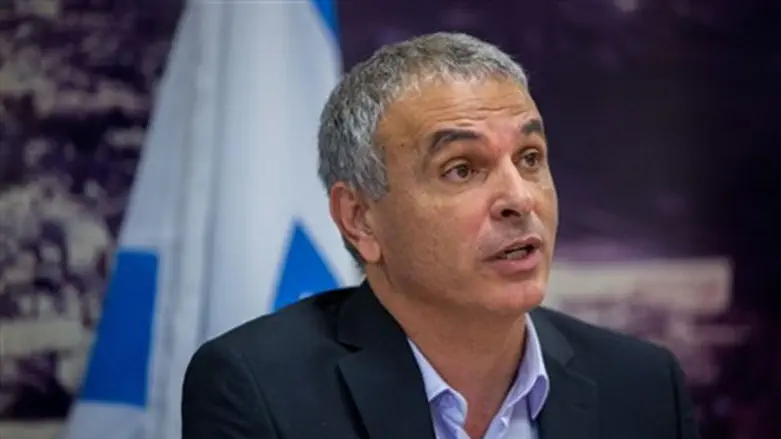
The annual conference of the World Bank and the International Monetary Fund took place last weekend in Washington. The Israeli delegation, led by Minister of Finance Moshe Kahlon and Bank of Israel Governor Prof. Amir Yaron, participated in the main events at the conference, and held a large number of meetings with global economic policy makers and international financial agencies from the business sector.
The delegation also included Ministry of Finance Director General Shai Babad, Head of the Market Operations Department at the Bank of Israel Andrew Abir, Ministry of Finance Chief Economist Shira Greenberg, Israel Tax Authority Director Eran Yaakov, and other senior officials from the Bank of Israel and the Ministry of Finance.
The delegation held meetings with Belgian Finance Minister Alexander de Croo, and with the director heading the group of countries in which Israel is a member at the International Monetary Fund, Mr. Anthony de Lanoy, as well as the Governor of the Belgian central bank, Pierre Wunsch.
The Ministry of Finance delegation met with Swiss President and Finance Minister Ueli Maurer, and Economics Minister Guy Parmelin, Dutch Finance Minister Wopke Hokestra, Norwegian Finance Minister Siv Jensen, and World Bank Chief Economist Penny Goldberg, among others.
The finance ministers with whom Minister Kahlon met were mainly interested in adopting Israeli cyber technology, with an emphasis on protecting their countries' financial systems. Together with the Swiss delegation, it was decided to hold a joint meeting between the ministries of finance at the beginning of 2020 on this issue. The Norwegian and Belgian delegations were interested in a drill concerning a cyber attack on the country that was held in Israel last February. It was agreed that joint teams would be established to work together in order to learn from it.
Another topic that was raised in discussions is renewing trade agreements with these countries. These agreements were signed in the 1990s when the Israeli economy was geared toward goods exports, but now, services exports have increased significantly, which makes new agreements necessary to deal with opening barriers and adjusting regulations.
The delegation received a global economic survey from the Chief Economist of the World Bank, prof. Penny Goldberg. The survey dealt with the global growth forecast in view of uncertainty surrounding trade struggles. The Chief Economist noted that countries approach her, "We want to be like Israel. We want to be technological countries." Ministry of Finance Director General Shai Babad invited a delegation from the World Bank to come to Israel in order to get to know the technologies the country has to offer in the areas of agriculture, water, and cyber, that those countries require.
The Bank of Israel delegation met with governors and senior central bank officials and delegations from major commercial banks around the world, and foreign investment houses that invest in the capital market in Israel, among others. They continue to be impressed by the good data on the Israeli economy. Within these discussions, the delegation explained the changes in monetary policy in recent months in view of the increasing risks due to the slowdown in the global economy and the trade war. The delegation also met with investment managers who manage the Bank of Israel's equity portfolio and foreign exchange reserves, to prepare for discussions on the annual allocation for 2020.
Minister of Finance Moshe Kahlon: "The message from the annual conference is very clear: Uncertainty is not good for the economy. The Israeli economy is in a good place relative to the economic challenges facing the entire world at this time, but all this may be in danger. The success of the Israeli economy in recent years is mostly due to the certainty and stability that the economic and political systems enjoyed. A prolonged period of political uncertainty may damage Israel's economy precisely during a complex period in the global economy.
"The Israeli economy has become synonymous with a successful and groundbreaking economy in the international technological sphere. More and more countries want to strengthen their cooperation with Israel in order to deepen their own knowledge in the fields of cyber, artificial intelligence, and other technologies. These partnerships are the direction the Israeli economy must follow in the coming years, and with correct and responsible leadership, we will expand these partnerships."
Bank of Israel Governor Prof. Amir Yaron: "The discussions and meetings showed that the situational assessment has worsened, and the various growth forecasts for most economies and for world trade have been lowered. The discussions also emphasized the fact that the high level of economic uncertainty, particularly concerning the trade war and Brexit, is weighing down on the chance to improve economic developments. The discussions also dealt with technological changes and their effect on the world of banking and finance, which creates many opportunities as well as risks that must be managed responsibly.
"The global economic discourse, as reflected at the conference this year, shows that monetary policy around the world is expected to remain accommodative for a prolonged period, and that we also require a responsible fiscal policy that supports growth in order to enable the economy to deal with the various challenges as well as opportunities. The Bank of Israel is taking these insights into consideration in setting out monetary policy and policy recommendations to the government."